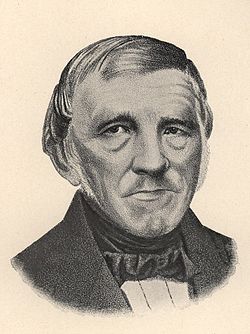Johann Encke
| Johann Franz Encke | |
|---|---|

Johann Franz Encke
|
|
| Born |
23 September 1791 Hamburg, Holy Roman Empire |
| Died | 26 August 1865 (aged 73) Spandau (now part of Berlin), Province of Brandenburg |
| Nationality | German |
| Fields | Astronomy |
| Institutions | University of Berlin |
| Alma mater | University of Göttingen |
| Academic advisors | Carl Friedrich Gauss |
| Doctoral students | Leopold Kronecker |
| Known for | 12P/Pons-Brooks comet |
| Notable awards |
Cotta prize (1817) Royal Medal (1828) Gold Medal of the Royal Astronomical Society (1830) |
Johann Franz Encke (German pronunciation: [ˈjoːhan ˈfʁants ˈɛŋkə]; 23 September 1791 – 26 August 1865) was a German astronomer. Among his activities, he worked on the calculation of the periods of comets and asteroids, measured the distance from the earth to the sun, and made observations of the planet Saturn.
Encke was born in Hamburg, where his father was the Pastor at the St. James' Church, Hamburg. He was the youngest of eight children, and at the time his father died when he was four, the family in straitened circumstances. Thanks to the financial assistance of a teacher, he was able to be educated at the Gelehrtenschule des Johanneums. He studied mathematics and astronomy from 1811 at the University of Göttingen under Carl Friedrich Gauss; but he enlisted in the Hanseatic Legion for the campaign of 1813–1814, serving as a sergeant in the artillery of the Prussian army, in Holstein and Mecklenburg. In 1814 he resumed his studies at the University but after Napoleon's escape from Elba he returned to the military, serving until 1815 by which time he had become a lieutenant.
Having returned to Göttingen in 1816, he was at once appointed by Bernhardt von Lindenau as his assistant in the observatory of Seeberg near Gotha (he had become acquainted with von Lindenau during his military service). There he completed his investigation of the comet of 1680, for which the Cotta prize was awarded to him in 1817 by judges Gauss and Olbers; he correctly assigned a period of 71 years to the comet of 1812. That comet is now called 12P/Pons-Brooks.
...
Wikipedia
